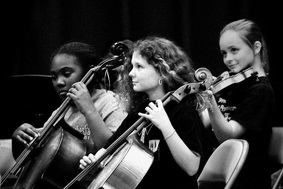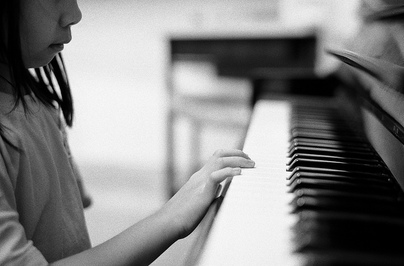|
Many parents aspire for their children to become musical; they enroll them in private music lessons, sign them up for summer music camps, and encourage them to join the band at school. Despite the great lengths that these parents go to raise musically inclined children, some young people simply never go on to become anything more than adequate musicians. Others, however, will flourish, enchanting everyone around them with their talent. What makes the difference? Where does musical aptitude come from? Is there a genetic trait that affects it? Quite simply, is musical talent learned or inherited? Like many issues, there are compelling arguments for and against each theory, with no clear victor in the discussion. The following is a careful consideration of each side of the debate concerning musical ability. Musical talent is inherited. Image courtesy Gordon | Flickr Image courtesy Gordon | Flickr Individuals who are fortunate enough to have parents with musical abilities are presumed to have a head start in developing musical talent. While there is no known “musical gene,” numerous studies have led us to conclude that genetics does play a part in an individual’s music ability. To evaluate the validity of a genetic disposition for musical talent, scientists recently conducted a series of tests on twins. After studying both fraternal and identical twins, the results showed that the similarities between identical twins were nearly 50 percent higher than those of fraternal twins. In other words, musical individuals who share genetic traits were more likely to exhibit musical aptitude than those who did not share similar DNA. A less scientific approach to the nature versus nurture argument, examining the lives of famous musicians and their children, can provide additional evidence. Johannes Bach, the famous classical musician and composer, has ties to 20 eminent musicians in his family. Wolfgang Amadeus Mozart was the son of famous musician Leopold Mozart. More contemporary examples include Enrique Iglesias, son of Julio Iglesias; Ziggy Marley, son of Bob Marley; and Natalie Cole, daughter of Nat King Cole. One is hard-pressed to ignore the impact that the genetics of these musical giants must have had on their children. Musical talent is learned.The counterargument to the genetic component of musical ability is the idea that musical talent is simply a learned behavior developed over time through perseverance. Supporting this theory is author Malcolm Gladwell’s conclusion that greatness in any endeavor requires at least 10,000 hours of time investment. To verify this claim, a study completed in 1993 discovered that musicians who were considered ‘elite’ practiced an average of 10,000 hours by the time they were 20 years old. The conclusion, that innate greatness is not the primary factor in success, has fueled the idea that genetics plays little role in musical ability. This has led to the idea that introducing children to music lessons early on can produce prodigies, depending on how rigorous their instruction and practice schedule is. As a result, many parents insist on a practice schedule that leaves little room for extraneous activities, in hopes of creating an elite musician. Musical ability is both inherited and learned. Image courtesy 鴉片丹 | Flickr Image courtesy 鴉片丹 | Flickr Most compelling of the “Where does musical talent come from?” argument is the theory that music ability can be both ingrained and taught. A child fortunate enough to be born to parents with musical talent may have a genetic pre-disposition toward musical ability, but without practice may be considered simply a mediocre musician. Alternately, by focusing on music instruction and practicing diligently, a child may become an accomplished musician without any genetic support from his or her parents. One valid claim for the pursuit of musical training has merit: regular practice of an instrument may allow for the discovery of hidden musical talent that may have been previously unknown. Furthermore, any musical skill inherited through genetics can be amplified by consistent training and practice. While it is true that some musicians seem to pass their musical abilities on to their children, there are an equal number of musicians with musically inept children. While it lacks in any clear answer, the results of the argument about the origins of musical talent can still give hope to parents everywhere. Regardless of a parent’s musical abilities, every child has the potential to achieve success in music. Like most things in life worth valuing, it simply takes work. For the child taking piano lessons, it may make little difference where the musical talent comes from; they simply know that they have to practice. For the person enjoying the music, however, the origin makes little difference—the music is simply beautiful. Wherever music comes from, it can speak to the soul. Comments are closed.
|
Photo used under Creative Commons from Marina K Caprara
 RSS Feed
RSS Feed
